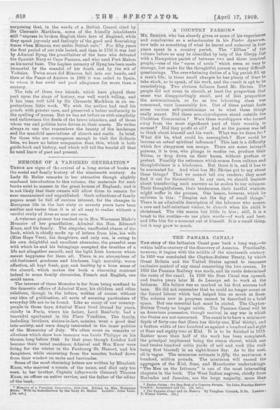A COUNTRY PARSON.*
Mn. SHRINE, who has already given us some of his experiences and conclusions as a schoolmaster in his Pastor Apart" now tells us something of what he learnt and unlearnt in four years spent in a country parish. The "Elften" of the volume before us may be identified by help of the Clergy last with a Hampshire parish of between two and three hundred people,—one of the "cures of souls" which seem so easy to manage, but make for the thoughtful parson so many difficult questionings. The overwhelming duties of a big parish fill up a man's life; in these small charges he has plenty of time to take stock, so to speak, of his work, and the result is apt to be unsatisfying. Two obvious failures faced Mr. Shrine. The people did not come to church, at least the proportion that came was disappointingly small, and of this propOrtinn the communicants, so far as the labouring class was concerned, were lamentably few. Out of these patent facts arose various self-questionings as to what these things really meant. Did these non-churchgoers stand outside the Christian Communion ? Were these worshippers who turned away from the most significant part of their worship in earnest ? Did they profit at all ? And so the parson was led to think about himself and his work. What was he there for P What did he, what could be, accomplish P How could he become an actual spiritual influence P This last is a difficulty which few clergymen can escape. There are some intrepid persons, it is true, who plunge in. mediae res, produce their . Bibles, or drop down on their knees, without preface or pretext. Possibly the reticence whieh comes from 'culture and thoughtfulness is a hindrance. But there it is, and it has to be accounted for. And what has Mr. Shrine got to say about these things? That we cannot tell our readers; they must find it out for themselves. In any case, we should hesitate about transferring such answers as he makes to our columns. Their thoughtfulness, their tenderness, their tactful .wisdom, might suffer in the process. One lesson, however, which he enforces is this : "Despise not the day of small things." There is an admirable description of the labourer who comes, a, rare and half-reluctant visitor, to church when his child is christened. The rite menus but little to him ; still, it is a break in the routine—to use plain words—of work and beer, and lifts him for a moment out of himself. It is a small thing, but it may grow to much.






































 Previous page
Previous page